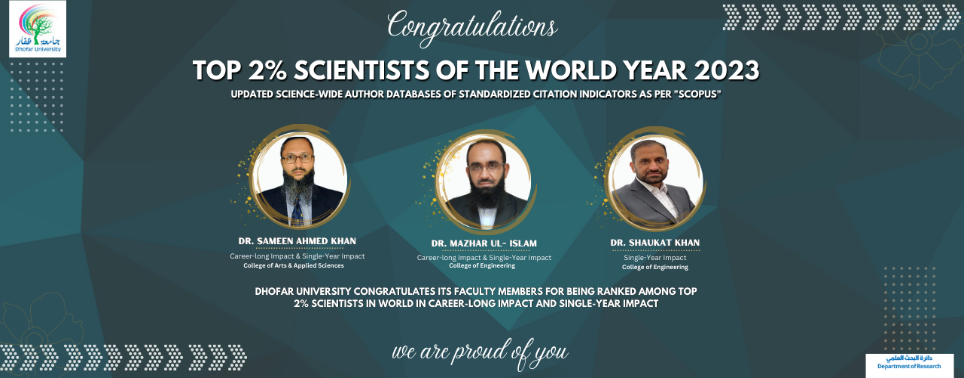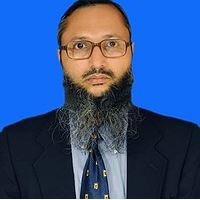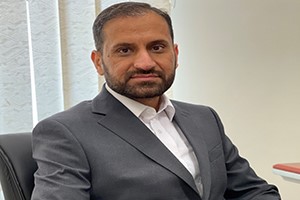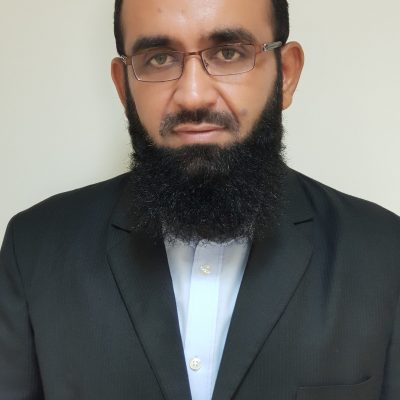
Three Dhofar University faculty members selected among the top two percent of scientists of the world
Three faculty members from the Dhofar University have been chosen among the top two percent of scientists in the world for the year 2023. This is a result of the University’s tireless efforts to encourage its staff to engage in meaningful research to serve the community and to achieve the research vision and mission of the institution and the nation at large.
Since 2019, John P. A. Ioannidis and collaborators from the Stanford University, Stanford, USA have been compiling lists annually that represent the top two percent of the most-cited scientists in various disciplines under two categories, “Single-Year Impact Indicator” and “Career-Long Impact Indicator” (see, http://dx.doi.org/10.17632/btchxktzyw.6 for details). The exhaustive lists have about 200,000 researchers in each list based on the data up to first October 2023 (for the calendar year 2022) in the reputed database, Scopus run by Elsevier Publishing Group, Netherland. Hence, these lists are frequently referred as the ‘Stanford Lists of Top Scientists’ or simply the ‘Stanford 2% Lists’, where the compilation is done!
The 2023, lists (released on 4 October 2022) have five entries from Dhofar University, Salalah, Sultanate of Oman. Dr. Sameen Ahmed Khan from the College of Arts and Applied Sciences, Dhofar University has been selected for the third time under both the career-long impact indicator and the single-year impact indicator respectively. Dr. Mazhar Ul Islam from the Department of Chemical Engineering, College of Engineering has been selected for the fourth consecutive year, under the single-year impact indicator and for the first time under the career-long impact indicator. Dr. Shaukat Khan from the Department of Chemical Engineering has been selected under the single-year impact indicator for the second time.
Dr. Sameen Ahmed Khan is an Associate Professor at Dhofar University’s College of Arts and Applied Sciences. He earned his Ph.D. in the Quantum Theory of Charged-Particle Beam Optics from the Institute of Mathematical Sciences, University of Madras, Chennai, India, under the guidance of Ramaswamy Jagannathan. He has single-handedly developed a unified treatment of light-beam optics and light polarization using quantum methodologies. Unlike other approaches, both the beam optics and light polarization emerge from a parent Hamiltonian, which is exact and derived from a matrix representation of Maxwell’s equations. This new formalism was among the thirty selected by the OPTICA (formerly, Optical Society of America) for the Optics in 2016, highlighting the world-wide breakthroughs innovations in optics and photonics in that year. He was selected Senior Member 2020 of OPTICA. He has authored four books; fifteen book chapters; and over eighty technical publications in journals and proceedings of repute. He has over 275 publications on science popularization.
Dr. Mazhar Ul Islam currently holds the position of an associate professor within the Department of Chemical Engineering at Dhofar University’s College of Engineering. He earned his doctoral degree in chemical engineering at Kyungpook National University in South Korea, where he subsequently served as a postdoctoral fellow and later as a contract professor for a period of two years. Dr. Mazhar Ul Islam is widely recognized for his significant contributions to the field of nanomaterials, biopolymers, and nanocomposites, as evidenced by his impressive publication record. He has authored over 130 articles that have appeared in esteemed international journals, in addition to approximately 30 book chapters. Furthermore, he has showcased his research at more than 80 national and international conferences. Dr. Mazhar Ul Islam’s work has garnered significant attention within the scientific community, with a substantial citation count of around 6850 and an impressive h-index of 49. He possesses a wealth of knowledge and experience in various domains, including Bacterial Cellulose, Composites, Nanocomposites, Biopolymers, Biodegradable, Biomaterials, and Biomedical Engineering.
Dr. Shaukat Khan obtained his PhD degree from South Korea and served as postdoctoral fellow and contract professor at Yeungnam University, South Korea for one year and Sun Yat-Sen University, China for three years. Dr. Shaukat has published high impact articles in the field of Energy Storage Devices, Optoelectronics, Functional Nanocomposites, Biomaterials and Nanomaterials in internationally renowned journals. Also, Dr. Shaukat has presented his work in many National and International conferences. His research is acclaimed by the international community in his field. Dr. Shaukat is expert in Energy Storage Devices including solar cells, capacitors and batteries and also have profound knowledge of Biomaterials, Nano-biomaterials, Functional Nanocomposites, Biopolymers, Materials Science, Materials Engineering and Polymer Engineering.
Dhofar University congratulates all the three faculty members on their accomplishments! Dhofar University is very confident that they will continue to conduct influential research with both local and global influence. The research culture in the University has immensely benefitted the students in their undergraduate and graduate projects, resulting in publications with students as co-authors. Some of these projects have won national and international recognitions. For about a decade, the full-fledged Department of Research in Dhofar University has been serving as a catalyst in promoting research across the campus through its generous grants supporting projects and participation in conferences along with incentives for publications and patents. The laurels echo the University’s dedication to establishing a scholarly economy as envisioned in the Oman Vision 2040 document.






